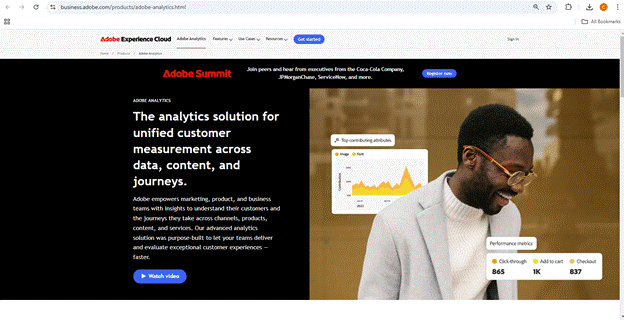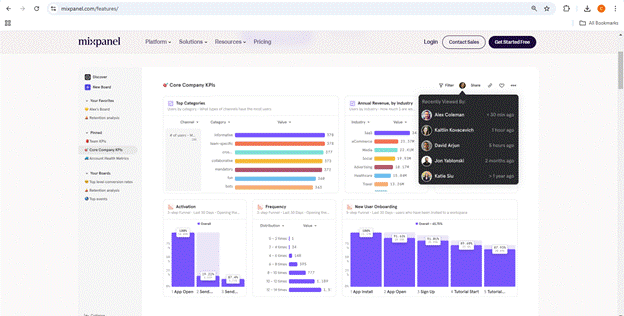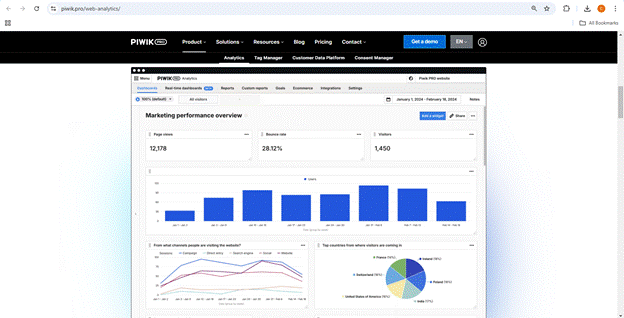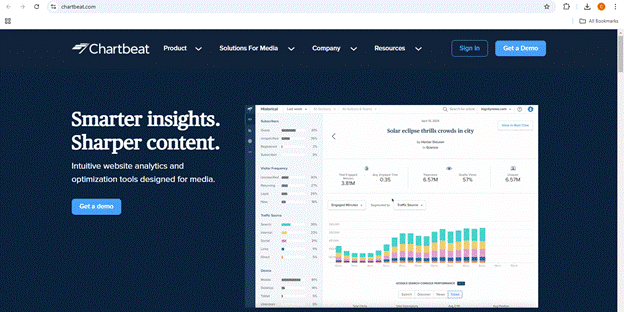For marketers, data is a goldmine. But not all data is clean. How do brands gauge the most accurate insights from what is already available?
Today’s competitive market demands marketing campaigns that use data in their decision-making strategies. The ample amount of information available allows marketers to rely more heavily on data-driven insights for strategy development.
But how can businesses gauge the correct information on their campaigns?
Through marketing analytics tools. These help brands obtain transformative results, understand the latest market trends, and identify the cracks.
In simple words, adopting such tools allows businesses to meet changing demands. However, the dynamic nature of the market entails diverse needs. Hence, organizations should ensure the tools they leverage have functionalities that consider and evaluate different channels – from social media to SEO.
So, choosing the ideal marketing analytics tool for your brand depends on understanding its different features.
Let’s dive into the 10 best marketing analytics tools now available and discuss their potentialities.
The Top Marketing Analytics Tools in the Market
1. Google Analytics
Digital marketing professionals consider Google Analytics an essential tool for their work. The platform provides users with real-time tracking functions and enables audience segmentation and goal setting.
Businesses of every scale depend on Google Analytics because it effortlessly connects with other Google services.

Marketers can leverage Google Analytics to monitor website traffic and assess user behaviors and conversion rate achievements. The tool’s advanced reporting capabilities enable users to gauge their campaign performance.
Organizations can discover their most effective engagement channels, which helps them cost-effectively allocate resources.
Google Analytics provides some functions free of charge but offers Google Analytics 360, which charges a premium fee for additional features that support large enterprise operations. Users choose it for marketing analytics because its extensive analytical capabilities are matched by affordable pricing.
2. Adobe Analytics
Adobe Analytics offers advanced data analysis capabilities through its sophisticated artificial intelligence techniques.
Businesses can leverage its capabilities to track customer journeys throughout multiple touchpoints to understand user behavior. Its customer segmentation and integration options are also a vital advantage.

Through this, businesses can predict market trends using the platform’s advanced real-time analytics and predictive modeling capabilities.
The platform works well for mid-to-large enterprises because its pricing structure adapts to specific business needs. Adobe Analytics provides businesses with an advanced marketing analytics platform with powerful analytical capabilities.
3. HubSpot Marketing Analytics
HubSpot Marketing Analytics provides businesses with a comprehensive solution to track their marketing campaign outcomes. HubSpot’s CRM integration enables companies to collect data instantly and interpret it without difficulty.

Businesses can monitor user activity and evaluate performance in social media channels and email marketing initiatives. Client companies without technical expertise can manage reports effectively through the platform’s user-friendly dashboard.
Users choose from multiple HubSpot pricing options but can utilize the platform’s fundamental features without charges. Companies focusing on inbound marketing utilize HubSpot’s robust analytical tools for their marketing analytics needs.
4. SEMrush
SEMrush entails competitive analysis, keyword tracking, and SEO optimization tools. Businesses can enhance their digital marketing approaches with comprehensive data from organic and paid search activities provided by this tool.

SEMrush allows marketers to analyze competitors while monitoring keyword positions and backlink status. The tool’s features help businesses keep their competitive standing in their industry.
The tool uses a subscription model for user payments where the price varies based on which features users can access. SEMrush delivers an advanced market analytics solution that enables businesses to refine their SEO and PPC campaign results.
5. Moz Pro
Moz Pro offers comprehensive SEO solutions to help companies enhance their search engine visibility. The domain authority metric becomes the benchmark for website trustworthiness among industry professionals.

Site audits and keyword research with backlink analysis are tasks marketing professionals can execute. The platform provides users with actionable recommendations to boost their search engine rankings.
Moz Pro offers flexible pricing plans suitable for businesses of all sizes. Companies dedicated to SEO efforts should view this marketing analytics tool as a significant investment decision.
6. Kissmetrics
Kissmetrics offers sophisticated tracking tools for customer journeys and behavioral analytics. Conventional tools perform collective data analysis yet investigate individual user behavior, which enables companies to sustain customer retention better.

Through analysis of user interactions on their website or app, businesses can identify the hurdles that impede conversion processes. This data enables marketers to develop individualized campaigns that simultaneously improve user experience.
The business cost structure is determined by its operational size and particular requirements. Kissmetrics provides complete analytical solutions that businesses find indispensable when they work to improve customer engagement.
7. Mixpanel
Mixpanel distinguishes itself with its event-based tracking system that helps businesses monitor user interactions in real-time. The platform provides full-funnel analysis capabilities together with sophisticated A/B testing features.

Marketers can improve conversion effectiveness by segmenting users based on their behavior patterns. The platform’s intuitive interface and artificial intelligence insights enable companies to boost engagement.
Mixpanel presents free and premium solutions tailored to meet the demands of both small startups and large enterprises. The marketing analytics tool provides organizations with comprehensive insights required for data-driven decision-making.
8. Piwik PRO
Businesses prioritizing data protection find Piwik PRO to be a comprehensive option. It is adept at providing advanced web and app analytics that comply with GDPR and other data protection laws.

This platform functions like Google Analytics while providing enhanced data protection capabilities. Organizations can analyze website user behavior and evaluate conversion rates and campaign performance while maintaining compliance with individual privacy rights.
The platform provides a cost-effective solution for enterprises seeking secure data management because pricing varies according to chosen features. Piwik PRO is the top marketing analytics solution for companies that value data privacy.
9. Chartbeat
Chartbeat delivers content analytics, making it an ideal choice for media organizations and publishers. Businesses utilize real-time audience interaction data to improve their content strategies.

Marketers using Chartbeat can track how far visitors scroll and how long they stay on pages while monitoring traffic sources. Content creators can produce more effective messages while applying these insights to modify their approach.
Chartbeat’s subscription pricing model allows businesses of various sizes to access its services. Content-driven organizations need Chartbeat to access vital marketing analytics tools.
10. Crazy Egg
Crazy Egg employs visual analytics to generate heatmaps and session recordings that illustrate website browsing behavior. This tool helps businesses to improve user experience and elevate conversion rates.

Businesses that examine user clicks, scroll patterns, and drop-off points will achieve better website designs and higher user engagement levels. The tool supports A/B testing capabilities, enabling users to test multiple web page versions.
Businesses of all sizes benefit from Crazy Egg due to its varied pricing plans for small and large corporations. This tool stands as an essential resource for website performance enhancement through the use of marketing analytics.
The Key Benefits of Marketing Analytics Tools for Your Organization
Businesses benefit from using marketing analytics tools in various ways.
The digital age has pushed businesses to generate massive amounts of data that were previously unseen. Website interactions, social media engagement, and email campaigns generate enormous data.
Organizations must use marketing analytics tools to get maximum value from their extensive data resources. This analysis will explain why businesses must utilize marketing analytics tools for improved marketing strategy development.
Data-Driven Decision Making
Marketing analytics tools provide businesses with the ability to make strategic decisions through data analysis, so they should invest in these tools. Current marketing practices that depend on guesswork and intuition fail to produce effective results in the present data-driven marketing environment.
Marketing analytics tools enable businesses to track campaign success, which creates a data-driven foundation for decision-making. Through real-time data analysis, marketers can identify which campaign elements work well or poorly to implement suitable strategic changes.
Companies assess their email campaign success through measurements of open rates alongside click-through rates and conversion data. Analytical data provides insights into successful past initiatives to guide future project planning.
Optimization of Marketing Campaigns
Marketing analytics tools provide businesses with real-time performance monitoring capabilities. They deliver real-time access to vital performance data, including engagement rates, impressions, and CTR, while tracking conversions instead of waiting for delayed post-campaign reports.
Monitoring KPIs in real time allows businesses to adjust campaign execution and enhance performance. Additionally, marketers can enhance an ad’s effectiveness by immediately editing ad copy, targeting, or design when online ads do not produce the anticipated engagement.
Agile campaign management allows businesses to adjust performance immediately rather than waiting until after a campaign ends to analyze results.
Targeted Marketing Strategies
Businesses can achieve an in-depth understanding of their target audience through marketing analytics tools. The tools enable precise targeting by analyzing customer behavior patterns, demographics, and personal preferences.
Organizations that consider customer needs and purchasing habits can precisely segment their audience and tailor their marketing messages accordingly.
By identifying customer segments with high engagement levels, these businesses can create marketing strategies that appeal to particular interests. They can create campaigns that connect with their audience, leading to improved customer satisfaction.
Measuring ROI
Marketers face significant hiccups while gauging results from different campaigns.
But marketing analytics tools are a savior. They allow businesses to track customer interactions from awareness to purchase. Businesses obtain accurate data on the revenue produced by each marketing campaign and every channel.
Marketing analytics tools provide businesses with the ability to track clicks, leads, and sales generated by paid search campaigns while evaluating their spending efficiency. Detailed tracking capabilities enable companies to enhance their management of marketing budgets and channel priorities.
Better Understanding of Customer Behavior
The complex nature of customer behavior creates difficulties for accurate prediction efforts. Through marketing analytics tools, businesses acquire an improved understanding of customer-brand relationships. Digital tools track website visits and social media interactions to analyze customer interests and purchasing behaviors while identifying sales funnel drop-off points.
Analytics tools reveal customer behavior patterns by tracking how long they stay on the website, what products they view, and identifying pages they leave before finalizing a purchase.
Businesses use data to pinpoint weaknesses in customer experiences, which allows them to optimize their websites and sales processes, leading to better conversion rates.
Enhancing Customer Experience
Businesses can improve customer experience by leveraging actionable insights from marketing analytics tools. By analyzing how customers connect with their business at different touchpoints, companies can create personalized and seamless experiences.
Businesses can use customer interest patterns in product categories to generate personalized recommendations and design targeted email offers and advertising campaigns. Personalized customer experiences allow companies to establish stronger relationships, resulting in higher sales figures.
Marketing analytics tools give companies the ability to identify recurring interaction issues with customers, which supports the implementation of proactive solutions while improving customer satisfaction.
Competitor Benchmarking
In today’s competitive marketplace, businesses must sustain an advanced position to succeed. Marketing analytics tools enable organizations to measure their success relative to competitors and industry standards. Assessing their performance relative to sector competitors helps businesses identify areas for improvement and uncover new business opportunities.
Analytics tools enable businesses to monitor competitors’ social media by tracking engagement, follower growth rates, and content performance. By using this method, businesses find flaws in their strategic approaches, allowing them to improve their means and create a unique market position.
Scalability and Efficiency
Marketing analytics tools provide essential scalability and efficiency, which enables businesses to broaden their marketing operations. Tracking and analyzing data becomes increasingly difficult and time-consuming as organizations expand.
Marketing teams can focus on strategic initiatives because marketing tools manage most aspects of the process.
A wide range of marketing analytics software solutions provide integration with other systems, such as CRM platforms, email marketing services, and social media networks. Through seamless integration, businesses can gather their marketing data in one place, which makes analysis and reporting processes faster and more efficient.
Companies that want to refine their marketing strategies must utilize marketing analytics tools. Leveraging valuable insights from marketing analytics tools regarding campaign performance, customer behavior, and ROI measurements enables businesses to make data-driven decisions for improved marketing outcomes.
Making Every Interaction Count
Businesses employing marketing analytics tools can optimize their strategies. These tools are a comprehensive resource for creating personalized campaigns and strengthening market competitiveness.
As digital marketing evolves, every organization must leverage marketing analytics tools as data-centric decision-making processes become crucial.
Organizations must implement marketing analytics tools to maximize return on investment and increase profitability.
The objective? A suitable tool will help provide actionable insights for businesses to succeed in the long term.

